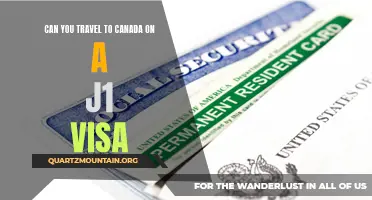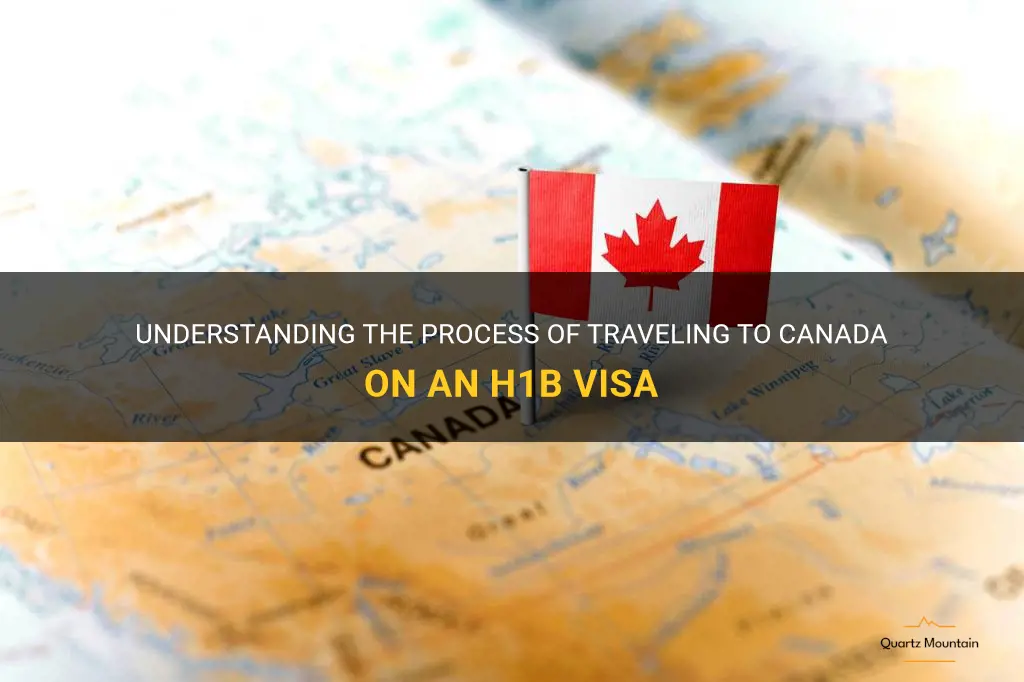
Traveling to Canada on an H1B visa can be an exciting opportunity for professionals seeking to expand their horizons and experience a new work environment. However, navigating the process can be challenging and requires a thorough understanding of the requirements and procedures involved. From obtaining the necessary documentation to understanding the immigration laws and regulations, this article aims to shed light on the intricacies of traveling to Canada on an H1B visa and provide valuable insights to make the journey as smooth as possible. So, fasten your seatbelts and join us on this journey to discover the ins and outs of traveling to Canada on an H1B visa.
What You'll Learn
- Can you enter Canada with an H1B visa from the United States?
- What are the restrictions for traveling to Canada on an H1B visa?
- Do you need a Canadian work permit in addition to an H1B visa to work in Canada?
- Are there any specific requirements or documentation needed when traveling to Canada on an H1B visa?
- Are there any limitations on the duration of stay in Canada on an H1B visa?

Can you enter Canada with an H1B visa from the United States?
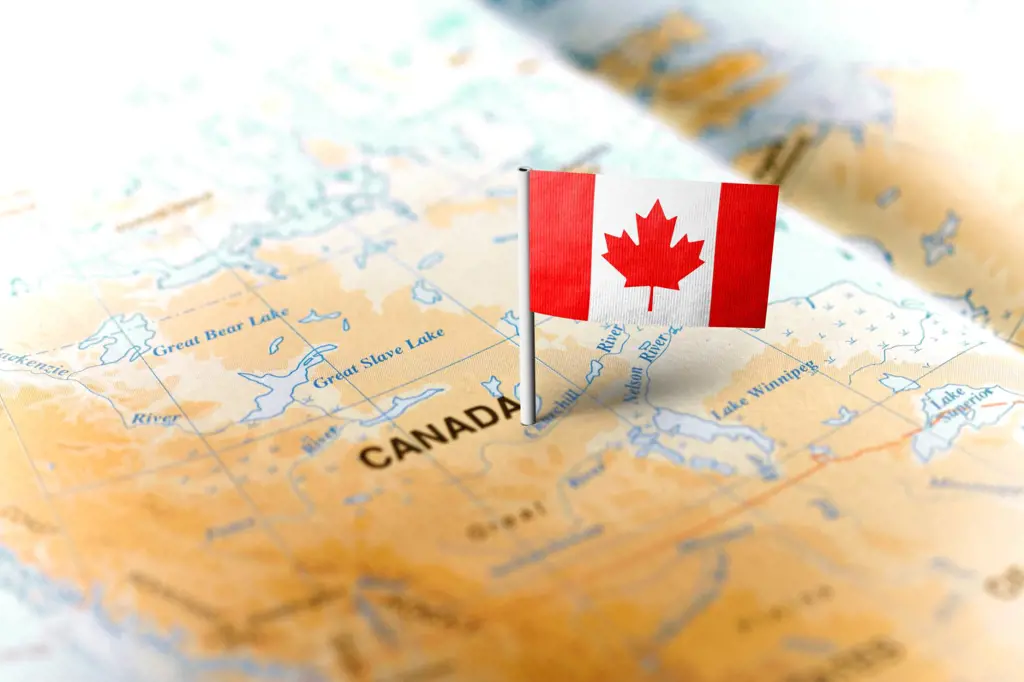
Many people who hold an H1B visa in the United States may wonder if they can also enter Canada with the same visa. The H1B visa is a non-immigrant visa that allows foreign workers to work in specialized occupations in the United States. While the H1B visa is specifically for the United States, it does not provide automatic entry into Canada. However, there are ways for H1B visa holders to enter Canada for work or other purposes.
One option for H1B visa holders to enter Canada is to apply for a work permit under the International Mobility Program (IMP). The IMP allows certain individuals with work experience or skills to work in Canada without a Labour Market Impact Assessment (LMIA). The Canadian employer must provide a job offer and submit an offer of employment form through the IMP. H1B visa holders can then apply for a work permit under this program, which would allow them to work in Canada for a specific period of time.
Another option for H1B visa holders to enter Canada is to apply for a Temporary Resident Visa (TRV), also known as a visitor visa. This visa allows individuals to enter Canada for temporary stays, such as tourism, visiting family or friends, or participating in business meetings or conferences. H1B visa holders can apply for a TRV and indicate their purpose of visit, such as attending a conference or meeting with a client. It's important to note that a TRV does not allow individuals to work in Canada, so if the purpose of travel is for work, a work permit would be required.
In some cases, H1B visa holders may be eligible for a North American Free Trade Agreement (NAFTA) work permit. Under NAFTA, certain professionals from the United States, including those in occupations such as engineering, computer systems analysis, and management consulting, may be eligible to work in Canada without a LMIA. These individuals must have a job offer from a Canadian employer and meet specific requirements for their occupation. H1B visa holders who meet the requirements under NAFTA may be able to enter Canada and work with a NAFTA work permit.
It's important for H1B visa holders to carefully review the requirements and eligibility criteria for entering Canada before making any travel plans. It may be necessary to consult with an immigration lawyer or expert to determine the best course of action based on individual circumstances. In some cases, it may be necessary to obtain a work permit or temporary resident visa before entering Canada, while in other cases, entry may be possible under certain agreements or programs.
In conclusion, H1B visa holders cannot automatically enter Canada with their visa. However, there are several options available for H1B visa holders to enter Canada, such as applying for a work permit under the International Mobility Program, applying for a Temporary Resident Visa, or in some cases, obtaining a NAFTA work permit. It's important to carefully review the requirements and eligibility criteria for each option before making any travel plans.
Essential Tips for Traveling to Dammam with an Umrah Visa
You may want to see also

What are the restrictions for traveling to Canada on an H1B visa?
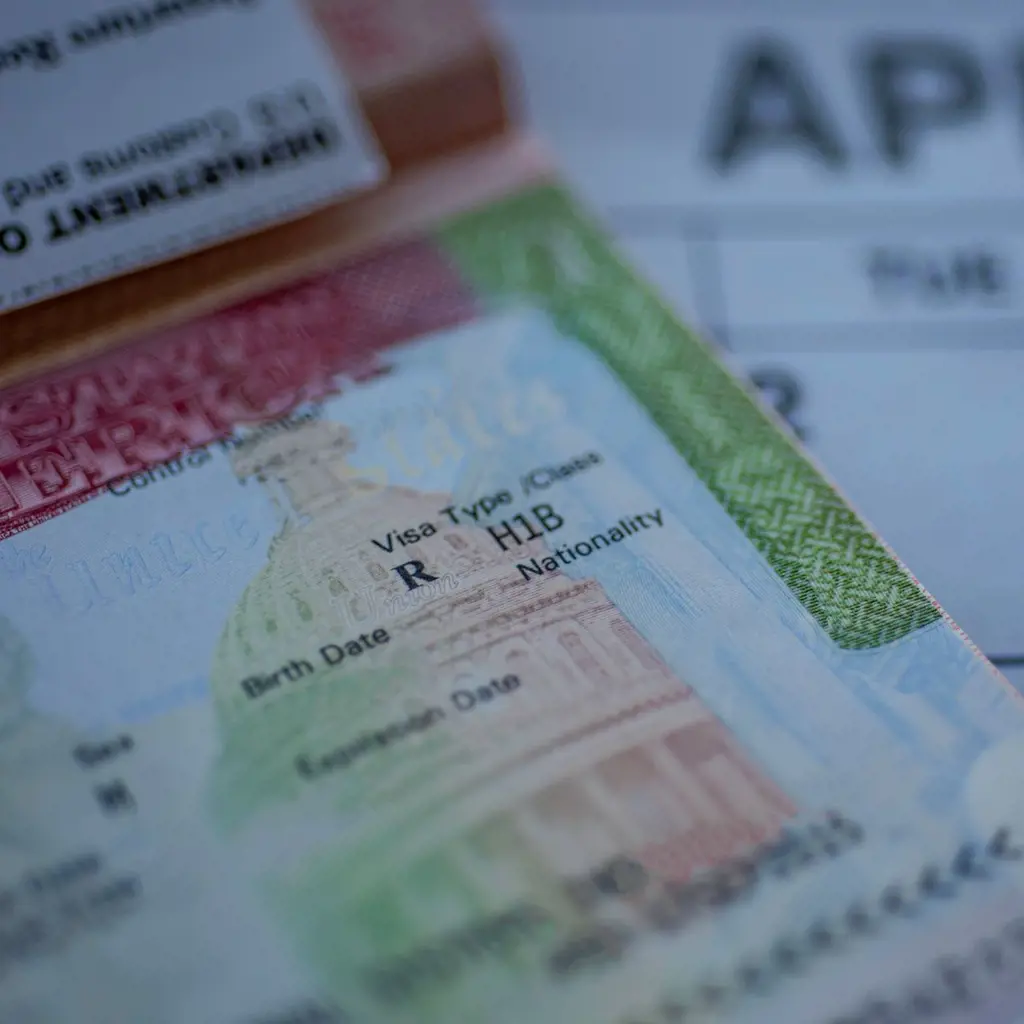
As an H1B visa holder, there are certain restrictions that you must be aware of when travelling to Canada. These restrictions are in place to ensure that you comply with the regulations of both the United States and Canada. In this article, we will discuss the restrictions and requirements for travelling to Canada on an H1B visa.
- Valid Passport: Before travelling to Canada, you must ensure that your passport is valid for the duration of your stay. It is also important to check the expiry date of your H1B visa, as you will need a valid visa to enter Canada.
- Electronic Travel Authorization (eTA): If you are travelling to Canada by air, you will need to apply for an Electronic Travel Authorization (eTA) before your trip. This is a mandatory requirement for visa-exempt foreign nationals, including H1B visa holders. The eTA is linked to your passport and is valid for up to five years or until your passport expires, whichever comes first.
- Letter of Employment: When entering Canada, it is advisable to carry a letter from your employer stating your job title, salary, duration of your stay, and purpose of your visit. This letter can help to substantiate the purpose of your visit and your ties to your home country.
- Proof of Funds: Immigration officers may ask for proof of funds to ensure that you have enough money to support yourself during your stay in Canada. It is important to carry sufficient funds in the form of cash, traveler's cheques, or credit cards to cover your expenses.
- Limitations on Work Activities: As an H1B visa holder, you are only authorized to work in the United States. This means that you cannot engage in any form of employment or business activities in Canada, even if it is for a short duration. It is important to adhere to this restriction to avoid any legal implications.
- Third-Country Invitations: If you are planning to visit Canada from a country other than the United States, you may need a visa to enter Canada. It is important to check the requirements for your specific country of residence and ensure that you have the necessary visa before travelling to Canada.
- Criminal Inadmissibility: If you have a criminal record or have been charged with a criminal offence, you may be deemed inadmissible to Canada. It is crucial to check your admissibility status before travelling to Canada to avoid being denied entry at the border.
- COVID-19 Travel Restrictions: During the COVID-19 pandemic, additional travel restrictions may be in place. It is important to stay updated with the latest travel advisories and guidelines from both the United States and Canadian authorities. This may include mandatory quarantine or testing requirements upon arrival in Canada.
In conclusion, travelling to Canada on an H1B visa comes with certain restrictions and requirements. It is important to ensure that you have a valid passport, apply for an eTA if required, carry a letter of employment, have sufficient funds, and adhere to the limitations on work activities. It is also important to be aware of any additional travel restrictions due to the COVID-19 pandemic. By following these guidelines, you can have a smooth and hassle-free trip to Canada.
Can a US Visa Holder Travel to Canada?
You may want to see also

Do you need a Canadian work permit in addition to an H1B visa to work in Canada?
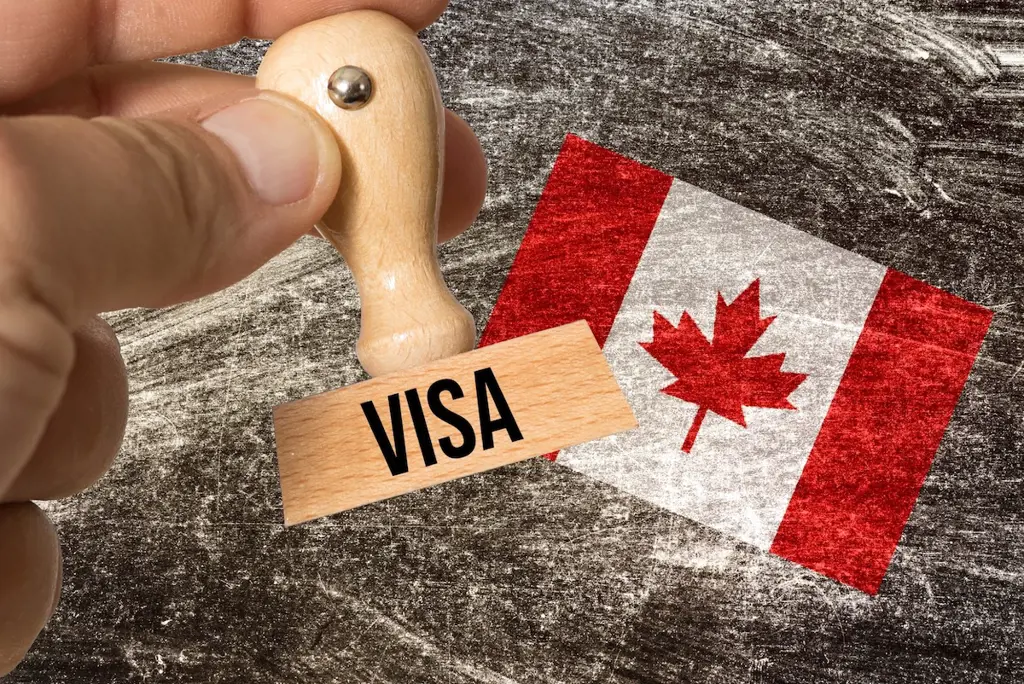
If you are an individual who holds an H1B visa and you are considering working in Canada, there are some important factors to consider. While the H1B visa allows you to work in the United States, it does not grant you automatic permission to work in Canada. In order to work in Canada as an H1B visa holder, you will typically need to obtain a Canadian work permit.
The Canadian work permit is a document that is issued by Immigration, Refugees and Citizenship Canada (IRCC) and allows foreign individuals to work legally in Canada for a specific period of time. There are a few different types of work permits that may be available to H1B visa holders, depending on the specific circumstances.
One common option is the International Mobility Program (IMP) work permit. This work permit is available to individuals who are coming to Canada through an employer that is recognized by the IRCC. In order to obtain this work permit, the employer must first obtain a Labor Market Impact Assessment (LMIA) from Employment and Social Development Canada (ESDC). The LMIA is a document that confirms that there is a need for a foreign worker to fill the position and that there are no Canadians available to do the job.
Another option is the NAFTA work permit. This work permit is available to individuals who are citizens of the United States or Mexico and who will be working in a profession that is covered by the North American Free Trade Agreement (NAFTA). Under NAFTA, certain professions, such as engineers, scientists, and computer systems analysts, are eligible for a streamlined work permit process.
In order to apply for a Canadian work permit, you will typically need to provide a number of documents, including a valid passport, proof of your H1B visa status, a job offer from a Canadian employer, and any necessary supporting documents, such as a LMIA or NAFTA certificate. You will also need to pay the required fees and submit your application to the appropriate IRCC office.
Once you have obtained your Canadian work permit, you will be able to work legally in Canada for the specified period of time. It is important to note that the work permit is typically tied to a specific employer and job, so if you change employers or jobs, you may need to obtain a new work permit.
In conclusion, if you hold an H1B visa and are considering working in Canada, you will typically need to obtain a Canadian work permit in addition to your H1B visa. There are various types of work permits available, depending on your specific circumstances, and the application process can be complex. It is recommended that you consult with an immigration lawyer or specialist to ensure that you meet all the requirements and submit a strong application.
Exploring the Visa Exemption for Mexican Travelers to Japan: Requirements and Restrictions
You may want to see also

Are there any specific requirements or documentation needed when traveling to Canada on an H1B visa?

Traveling to Canada on an H1B visa requires specific requirements and documentation. The H1B visa is a non-immigrant visa that allows foreign workers to work in the United States. However, for individuals with H1B visas who wish to travel to Canada, additional steps need to be taken.
Here are the specific requirements and documentation needed when traveling to Canada on an H1B visa:
- Valid Passport: A valid passport is the first requirement for any international travel. Make sure your passport is valid for at least six months beyond your planned stay in Canada.
- H1B Visa: Your H1B visa allows you to work in the United States, but you will need a valid visa to enter Canada. Check if you need a visa to enter Canada based on your citizenship.
- ETA or Visa: Depending on your citizenship, you may need either an Electronic Travel Authorization (eTA) or a visitor visa to enter Canada. An eTA is required for visa-exempt individuals flying to or transiting through Canada. However, individuals from certain countries may require a visitor visa. Check the Government of Canada's official website to determine the specific requirements based on your citizenship.
- Employment Letter: To demonstrate your purpose of visit and employment status, you should carry an employment letter from your employer in the United States. The letter should include your job title, salary, employment dates, and the purpose of your trip to Canada.
- Proof of Ties to Home Country: To show that you do not intend to immigrate to Canada, it is essential to provide evidence of ties to your home country. This may include proof of property ownership, financial ties, employment contracts, or family ties.
- Travel Itinerary: Prepare a detailed travel itinerary that outlines your trip to Canada, including the dates, places you plan to visit, and activities you intend to participate in.
- Proof of Financial Resources: Canadian authorities may request proof of sufficient financial resources to support yourself during your stay in Canada. This may include bank statements, credit card statements, and employment documents showing your salary.
- COVID-19 Requirements: Due to the ongoing COVID-19 pandemic, traveling to Canada currently requires additional documentation. Check the Canadian government's official website for any specific requirements related to COVID-19 testing, quarantine, or vaccination.
- Consulate or Visa Application Center: Depending on your citizenship, you may need to apply for a visa or eTA at the nearest Canadian consulate or visa application center. Ensure you have the correct application forms, passport photos, and fees ready.
It is crucial to remember that requirements and documentation may vary based on your specific situation and citizenship. It is recommended to check the official Government of Canada website or consult an immigration lawyer for the most up-to-date and accurate information before traveling to Canada on an H1B visa.
Traveling Abroad with a U-Visa: What You Need to Know
You may want to see also

Are there any limitations on the duration of stay in Canada on an H1B visa?

The duration of stay in Canada on an H1B visa is subject to certain limitations. The H1B visa is a non-immigrant visa that allows foreign workers to work in the United States for a temporary period. While the H1B visa is primarily meant for the United States, it is also possible for individuals on H1B visas to travel to Canada for short periods of time. However, it is important to understand that the H1B visa does not grant automatic entry into Canada, and different rules apply for individuals who wish to travel to Canada on an H1B visa.
The duration of stay in Canada on an H1B visa is generally limited to the validity period of the visa. The validity period of an H1B visa is usually three years, but it can be extended up to a maximum of six years. Therefore, if an individual's H1B visa is valid for three years, they can stay in Canada for up to three years. However, it is important to note that the duration of stay in Canada on an H1B visa may also depend on the purpose of the visit and the specific requirements of the Canadian immigration authorities.
In addition to the validity period of the H1B visa, individuals on H1B visas may also be subject to the maximum allowable stay in Canada. The maximum allowable stay refers to the maximum period of time that an individual can stay in Canada during a single visit. For example, if the maximum allowable stay is six months, an individual on an H1B visa can stay in Canada for up to six months during a single visit. However, it is important to note that the maximum allowable stay may vary depending on the specific circumstances of the visit and the discretion of the Canadian immigration authorities.
It is important for individuals on H1B visas to carefully plan their travel to Canada and ensure that they comply with all the necessary immigration requirements. This may include obtaining a Visitor Visa or an Electronic Travel Authorization (eTA) depending on the individual's country of citizenship. It is also advisable to consult with an immigration lawyer or a qualified immigration consultant to understand the specific requirements and limitations that may apply to travel to Canada on an H1B visa.
In conclusion, there are certain limitations on the duration of stay in Canada on an H1B visa. The duration of stay is generally limited to the validity period of the visa and may also depend on the maximum allowable stay during a single visit. It is important for individuals on H1B visas to understand and comply with the necessary immigration requirements when traveling to Canada.
Exploring the Possibility: Traveling to Canada on a B1 Visa
You may want to see also
Frequently asked questions
Yes, as an H1B visa holder, you are generally allowed to travel to Canada for business or tourism purposes. However, you will need to obtain a visitor visa or an Electronic Travel Authorization (eTA) depending on your country of citizenship. It is recommended to check with the Canadian consulate or embassy to confirm the specific travel requirements.
Depending on your country of citizenship, you may need to obtain a visitor visa or an Electronic Travel Authorization (eTA) to enter Canada. The eTA is usually required for travelers from visa-exempt countries, while a visitor visa is generally required for travelers from countries that require a visa to enter Canada. It is important to check with the Canadian consulate or embassy for the most up-to-date information on travel requirements.
No, you cannot work in Canada on your H1B visa. The H1B visa is specific to the United States and allows you to work for a specific employer in the U.S. To work in Canada, you would need to obtain the necessary work permit or visa specific to Canada's immigration laws and regulations.
Yes, it is possible to apply for a work permit in Canada while on your H1B visa. However, you would need to meet the requirements set by the Canadian government for the specific work permit you are applying for. It is recommended to consult with an immigration lawyer or expert to understand the process and eligibility criteria.
While you can generally travel between the U.S. and Canada on your H1B visa, it is important to note that each country has its own immigration policies and requirements. It is advisable to carry proper documentation, such as a valid passport, visa, and any necessary permits or authorizations when traveling between the two countries. Additionally, it is recommended to check the entry requirements and travel restrictions imposed by both countries before planning your trip.




